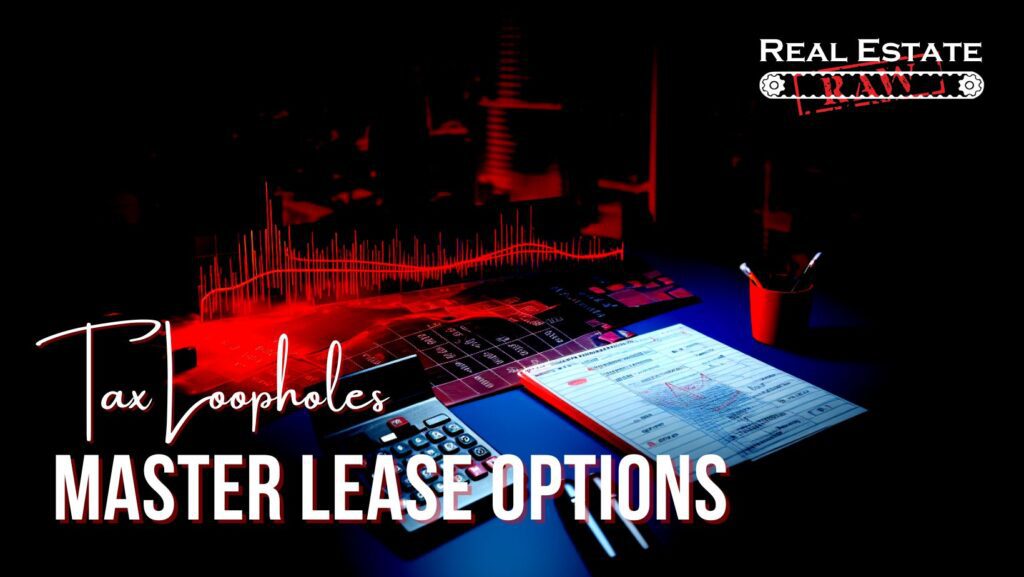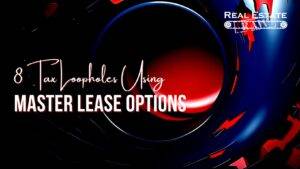This article does not give tax advice. Seek the advice of an accountant in your state before using any of these tips.
So, what exactly is a Tax Loophole? It’s simple – a loophole is a tax incentive provided by our government as a way of encouraging the economy to grow. It should come as no surprise that most tax loopholes are found in the areas the government would like us to concentrate on like investing in real estate. It’s classic “carrot and stick” psychology.
Many loopholes are quite well known. For example, if you own your own home, you can usually deduct all the interest you pay on your mortgage. Other loopholes are hidden little treasures. They take a bit more looking to uncover, but like most treasure, it’s very worthwhile.
Disclaimer– this article does not provide tax nor legal advice. Seek professional counsel before using this or any other creative financing techniques.
Believe it or not, the government actually wants us to use master lease options as a creative financing strategy for multifamily investing. In fact, they incentivize us to do so by providing us with several Tax Loopholes specifically for lease options. There are tax benefits for lease option sellers as well as buyers. Want to know what they are? Read on to find out!
Loophole 1: Lease-Options Sometimes Provide Bigger Write-offs
For the buyer/optionee (tenant), 100% of the lease payments are tax deductible in the year paid (assuming you are using the property for business purposes). As compared to a traditional purchase, only the mortgage interest portion of the monthly payment is tax deductible.
Loophole 2: The Options Payment is not Taxable
For the seller/optionor, the options payment received is not taxable until the tenant exercises that option or when the option expires. What a wonderful loophole this is: to be able to receive a lump-sum of cash up front free from current taxes!
Loophole 3: Monthly Options Payment is not Taxable
For the seller/optionor, the options payment apportioned to the tenant’s monthly rent is not taxable until the tenant exercises that option or when the option expires. What a wonderful loophole this is: to be able to receive part of your monthly rent free from current taxes!
Loophole 4: Depreciation Advantage of Lease-Options
A single-family lease option leaves you owning the asset until the tenant actually completes the purchase. As such, you still take the depreciation allowance and continue receiving all benefits of the real estate investment. Also, cost segregation is still a great strategy that you can use to maximize your depreciation write-off with lease-options!
Loophole 5: Tax Deductions of Lease-Options
With a lease option, you as the owner retain all tax benefits relating to the property including expenses, insurance, repairs, and improvements. Since you still own the property legally, you retain all the tax perks!
Loophole 6: Use Lease-Options to Ensure Favorable Capital Gains Rate on Sale
A lease-option program set up to last for at least one year ensures that you have held the property for sufficient time to pay tax at the long-term capital gains tax rate. Depending on the amount of gain you are looking at, using the lease option strategy can save up to 50% in taxes!
Loophole 7: Use Lease Options to Avoid Dealer Status
Dealer status is a bad word in the tax world. It is given to those who are in the active business of buying and selling real estate on a short-term basis like Fix-N-Flips. Dealers at times may pay 50% or more in taxes as compared to someone who is not a dealer. One strategy to avoid dealer status is to use lease options. Lease options allow you to avoid the dealer status if you can have the agreement set up so that your holding period exceeds 365 days. This can save you over 50% in taxes if you are actively involved in real estate.
Loophole 8: Use Lease-Options to Conduct 1031 Like-Kind Exchanges
A lease option property held for at least a year is considered an investment property. When a tenant buyer purchases the property, you can conduct a 1031 like-kind exchange by purchasing another property and deferring the tax due on your first property into the other property. This is a powerful strategy for any real estate investor but an especially powerful one for those who are in the business of flipping properties.
Does it ever seem to you that CPAs and Attorneys have their own language? They do! The better you can speak their “secret language”, the better the results you will have.
For more information on using master lease options go www.realestateraw.com and join my Facebook group Real Estate Raw for Multifamily Investors.
Best of luck!
Bill Ham


































